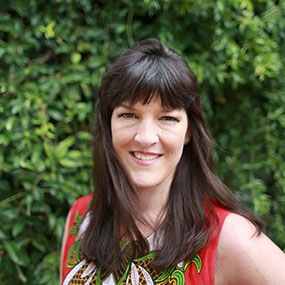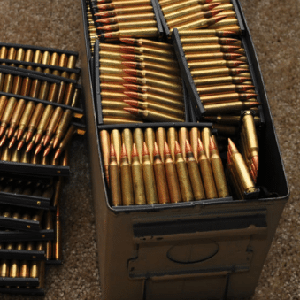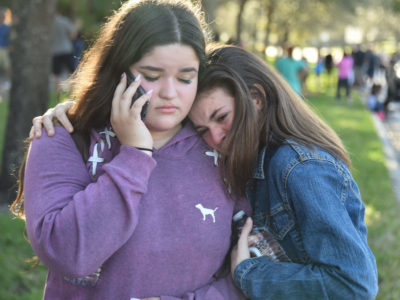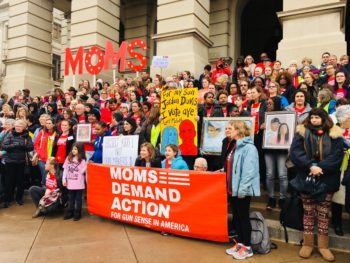Gun sales are soaring in Georgia this year, with background checks for buyers already far exceeding the total for all of last year.
The issuance of licenses for carrying a gun is rising in the state as well, according to probate court judges.
Many of the purchases are by people who have never bought firearms before, experts say.
The increase in gun sales has raised public health concerns. More firearms increase the risk of more unnecessary deaths and injuries from gunshots, said Dabney Evans, an assistant professor of global health in the Rollins School of Public Health at Emory University.
Reasons for the rising gun sales include general uncertainty about the COVID-19 pandemic and recent civil unrest, along with election-related turmoil, Evans said.

“There is a lot of insecurity,’’ she said Thursday. “More people are feeling insecure, and many are feeling insecure for the first time. I think it’s worrisome.’’
The FBI conducts background checks to ensure that a prospective buyer has no criminal record that would block a firearms purchase.
Through this September, the agency reported 658,000 checks in Georgia, as compared with 539,000 for 2019. The background checks in Georgia surged in June and July, after the death of George Floyd during an arrest in Minneapolis in late May, which led to a murder charge against one officer and related charges against others. Anger over the case sparked widespread protests that at times turned violent.
“You’re seeing a lot of first-time gun buyers,’’ said John Monroe, vice president of GeorgiaCarry.org, an organization seeking to protect gun owners’ rights.
Monroe also cited the general uncertainty around COVID-19 and the protests over racial injustice. “And probably the political climate,’’ he added. “People don’t know what’s going to happen,’’ he added.
If Democrat Joe Biden is elected president, Monroe said, “there could be increased [gun] regulation.”
Monroe added that there’s a national shortage of ammunition, fueled by the jump in gun sales.

Michael Weeks, the owner of the Georgia Gun Store in Gainesville, told NPR in July that from what he was seeing, most of the gun buying surge involved new owners. He said he was not doing much business with people who already owned guns. And he said his new customers were people of all different races and income levels.
“We see a wide diversity of people come to the door,” he said. “It’s all over the board.’’
The public health concerns include risk of suicide.
Daniel Webster, director of the Johns Hopkins Bloomberg School of Public Health’s Center for Gun Policy and Research, said in April that “we have a perfect social brew for increased suicide risk — social isolation, anxiety, financial ruin. So many folks experiencing those sets of emotions and conditions, have access to a gun.”
High-profile crimes raise tensions
Gun sales often have spiked after mass shootings and subsequent efforts to pass gun control legislation.
During the administration of Democratic President Barack Obama, he called for new restrictions on firearm sales after an elementary school massacre in Newtown, Conn., in 2012, and again after a high-casualty terrorist attack in San Bernardino, Calif., in 2015. In the wake of his comments, gun sales jumped by 3 million and 1.6 million, respectively, beyond the expected level over the few months of elevated sales, the Brookings Institute reported.
In Parkland, Fla., a major school shooting in 2018, followed by local student-led demonstrations in favor of gun control, led to a nationwide spike in gun sales of 700,000.

An official from the National Rifle Association told CNN in March that Americans’ concern about personal safety during the pandemic is probably a key factor in the surge of FBI background checks. “Firearm sales go up in times of uncertainty because Americans know their safety is ultimately in their own hands,” said NRA spokesperson Amy Hunter in a statement to the network.
Nationally, background checks associated with the sale, transfer or permitting of firearms set an all-time record in June when the FBI conducted more than 3.9 million checks. The second-highest month was March of this year followed by March 2020 when the agency saw 3.7 million checks.
In July 2020, the FBI conducted more than 3.6 million firearm background checks, up from about 2 million in July 2019.
“My biggest concern involves the potential number of first-time gun buyers who, before March, did not think they needed a gun,” said David Chipman, a retired ATF special agent and senior policy adviser to Giffords, an organization countering gun violence, according to CNN.
WGXA in Macon reported in July that pawn shop owner Cindy Grantham had seen gun sales increase dramatically.
Grantham told the station that those customers came in looking for one thing: “They want security,” she said. “That’s why they’re buying handguns and long guns. It’s for the security.”
Reuters reported last month that a surge in people buying guns since the pandemic began has flooded the FBI’s background check system, causing a spike in the number of delayed checks and allowing gun sales to proceed without them, FBI data showed.
The gun control advocacy group Everytown for Gun Safety obtained FBI data through a Freedom of Information Act request. There was a 54 percent increase in the number of background checks that were delayed past three days in the March-through-July period, as compared with the same time last year, the data show.

Courtney Spriggs, Georgia chapter leader of Moms Demand Action, a group that’s part of Everytown, said her organization views the surge in gun sales as a public health issue. “Children are in more danger,’’ she said Thursday.
Spriggs, a gun owner, said she would like to see universal background checks for all gun purchases, the disarming of those who are convicted of domestic violence, and the safe storage of firearms.
Spriggs was formerly in law enforcement. “I have seen the horrors that gun violence has brought,’’ she said. “My husband, who is in law enforcement, has been shot at.’’

